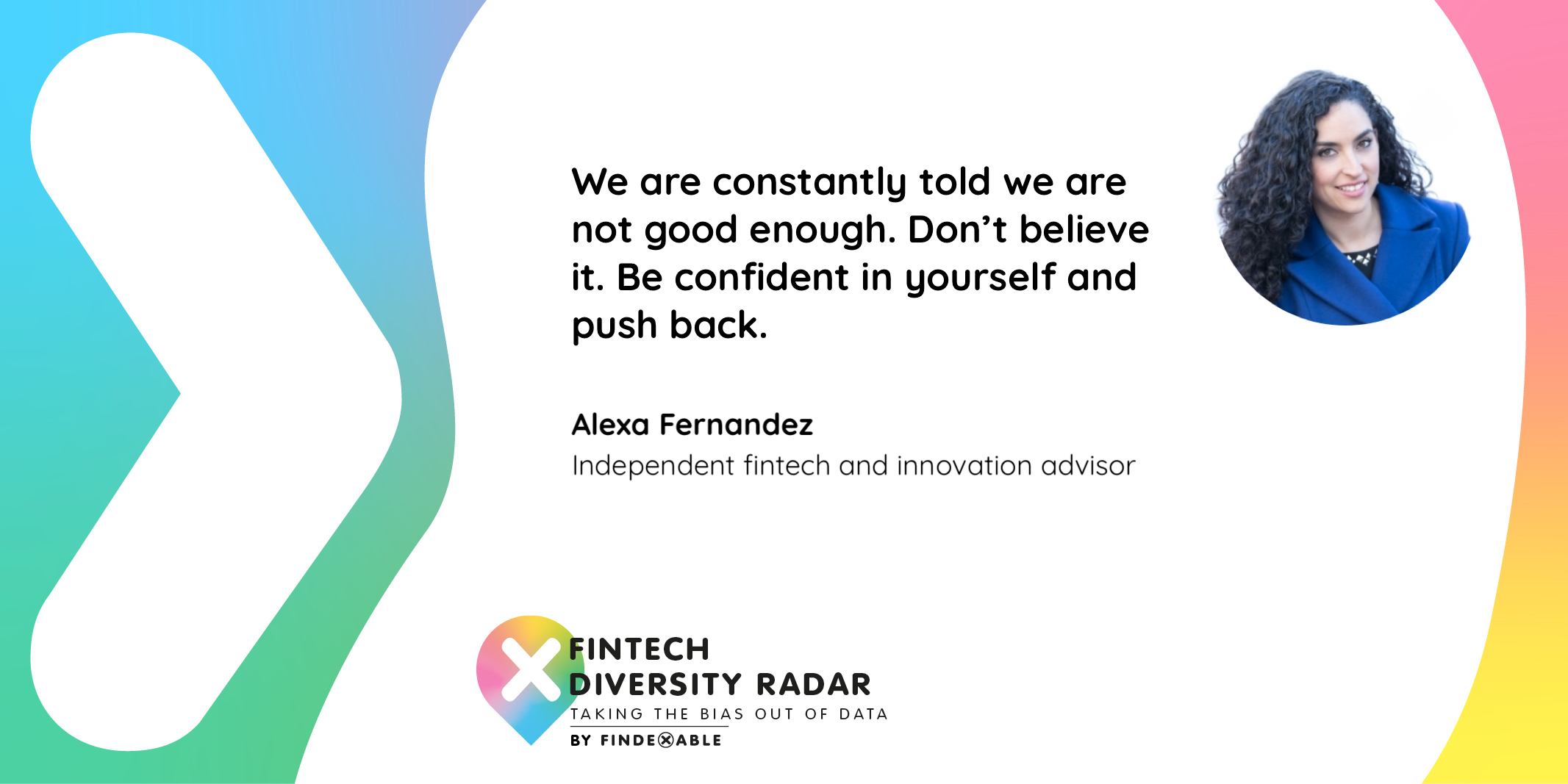Talent, opportunities and embracing change
An interview with Alexa Fernandez, Independent fintech and innovation advisor
CE: Please tell us about yourself and your journey into Fintech and founding Hourglass Innovations.
AF: I discovered fintech via Level 39 in Canary Wharf, London. When I was working in Corporate and Investment Banking, I was charged with organizing a tour for the Head of BBVA’s Corporate Venture Fund. I was amazed to find this world of innovation and entrepreneurship, and made it my mission to become a part of it! I was given the opportunity to join a new team at BBVA, New Digital Businesses, which was like a startup within the bank, where we were building, buying, investing and partnering with fintechs.. I have then gone on to work in the Innovation team, with a focus on creating partnerships between fintechs and business areas within the bank. Finally, I worked at a fintech, doing the inverse. All of that experience has led me to conclude that innovation is an hourglass.
Innovation adoption at corporations takes on the shape of an hourglass: it’s promoted at the top by management, and embraced at the bottom by employees working with customers. But it gets stuck with middle management, and innovation drips, like an hourglass. I decided to go independent and advise companies through my new company, Hourglass Innovations.
CE: What is your opinion on the current state of workplace hiring from a diversity perspective? What is your experience?
AF: I don’t think women and people of color are given the same chance as white men. I feel we are being underestimated and rarely given the benefit of doubt. I also believe that women – more so than men – tend to be judged by our appearance, even though no one will ever admit to it.
My experience has been of men being dismissive of my education and experience. There is one interview that really stands out for me: the COO of a growing Fintech was interviewing me for a Head of Partnerships role. He spent most of the time talking about himself. When he finally gave me the chance to speak, he only gave me 5 minutes, and immediately concluded that “I didn’t have the right network nor the right profile for the job”. What was really offensive about that comment is that I introduced the Founder to his first angel investor. Had he taken the time to get to know me and studied my CV (turns out he hadn’t even read it), he would have understood that I could be a great asset for the Fintech. Instead, he already had a “picture” in his mind of the kind of person he wanted to hire, and I didn’t fit that image. This has happened to me several times. I find it sad, as Fintechs are missing out on hiring great people and diversifying their teams. This is in my opinion the biggest problem with hiring and so-called diversity initiatives. The only way to change it is to change the mindset of the men who are doing the hiring.
CE: As a Champion for the Fintech Diversity Radar, tell us more about the idea around, ‘It is not you, it’s them.’ What is the story behind the quote?
AF: Women are constantly being told we are not good enough. Don’t believe it. Be confident in yourself and push back. Just remember: It’s not you, it’s them.
I’ve been told numerous times by men at work and during job interviews that I am not good enough. They’ve told me things like “you don’t have the right skills; you’re bossy and pushy; you are only good at one thing and it’s not what we need” amongst many other things. And sometimes they compare me to other men/colleagues and tell me how much better those men are than me.
At the beginning, I believed them and questioned myself repeatedly. But I started to share my experience with friends, and they too had similar stories. I paid closer attention, and started to notice a pattern: men are dismissive of women’s experience and education and feel entitled to tell us that. This has enabled me to understand that it’s not me, it’s them. It gave me the courage to stand up for myself. Several months ago, I was told (by a man) that I didn’t have the right skills for the job, to which I responded “You’re wrong, and here’s why”. It felt great!
CE: What advice do you have for anyone looking to enter the world of Fintech?
AF: The same advice that was given to me by a venture capitalist when I was trying to enter the world of Fintech: learn all about it! He told me I needed to study fintech and startups, and be able to talk to entrepreneurs in their language. I made it my priority to do just that. I did it by attending hackathons, events and networking sessions after work and on weekends. I considered myself lucky at the time: I live in London, one of the epicenters of fintech, and had access to all those events. Now that events are virtual, anyone can attend them, not to mention it’s easier and less time consuming as you don’t have to factor in trekking across a rainy London to get to all those events! It took me one year to eventually get into the Fintech world, but all the time and energy I put into it was well worth it. I encourage anyone looking to enter this space to do their homework and network like crazy.
To find out more about findexable’s Fintech Diversity Radar, visit: https://findexable.com/diversity-radar/
For more information and insight – get in touch at info@findexable.com
Download The Global Fintech Index 2020 City Rankings on http://bit.ly/2020GFI

